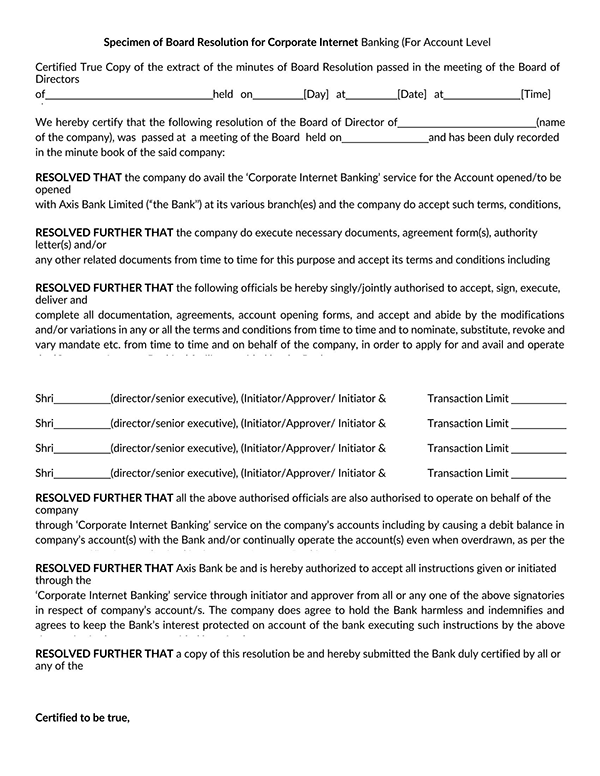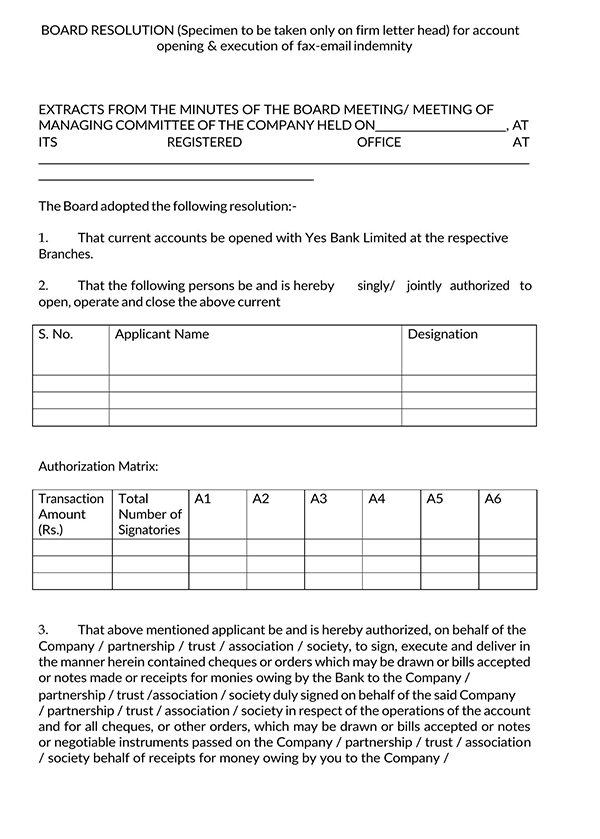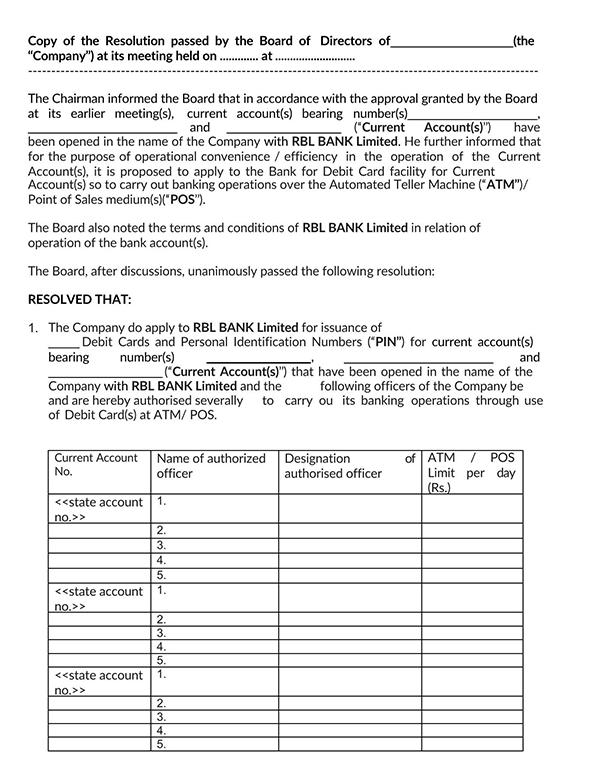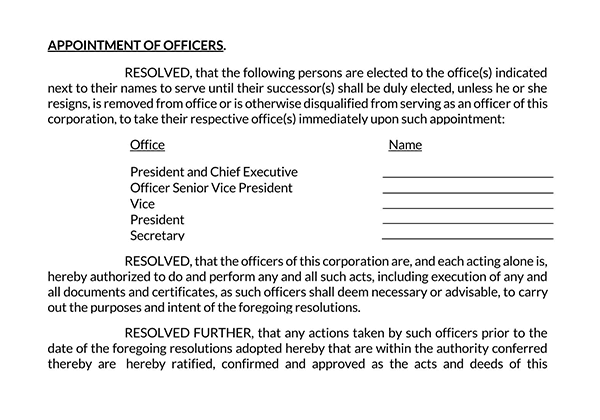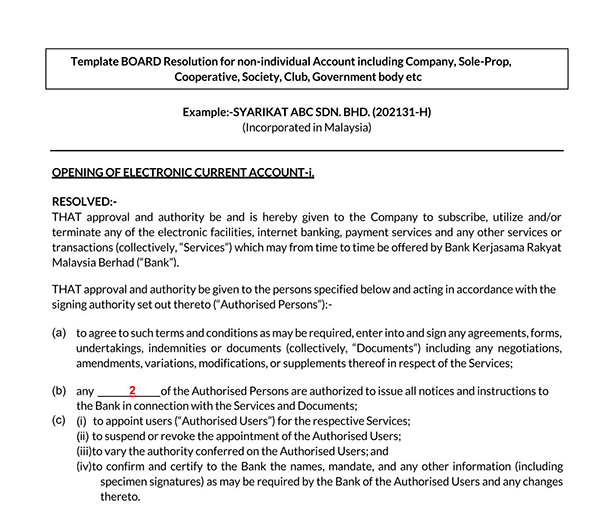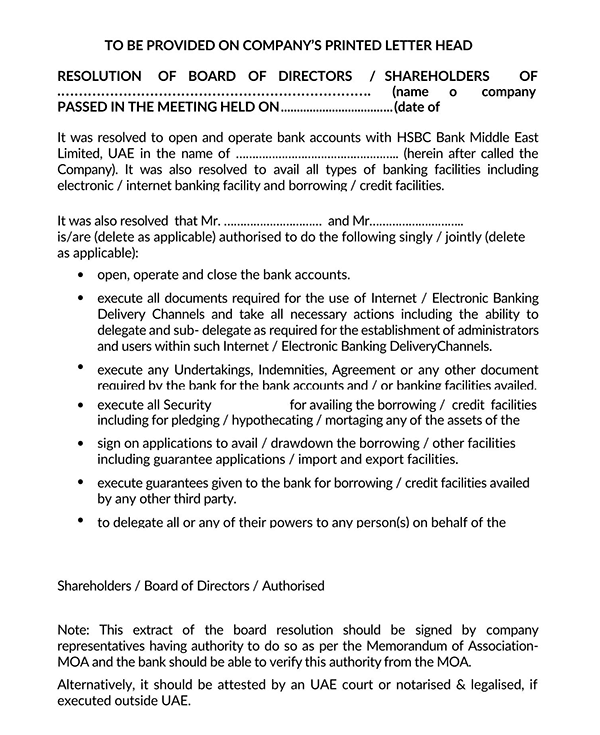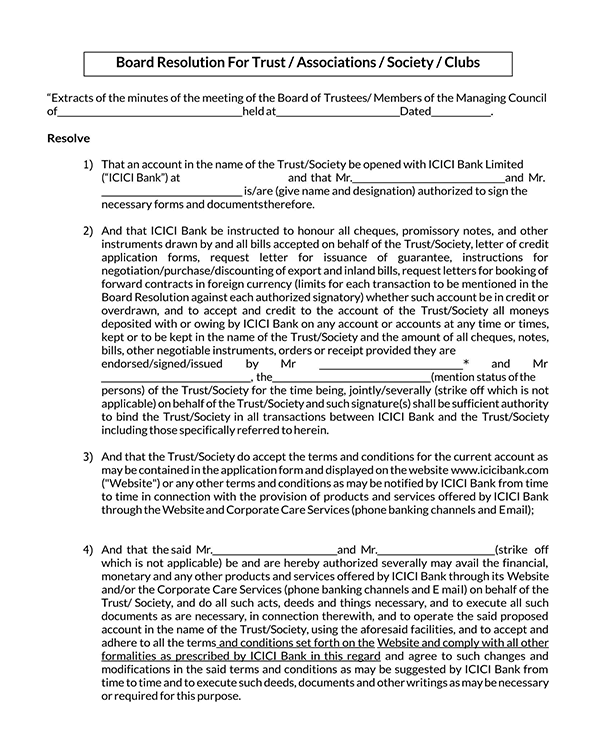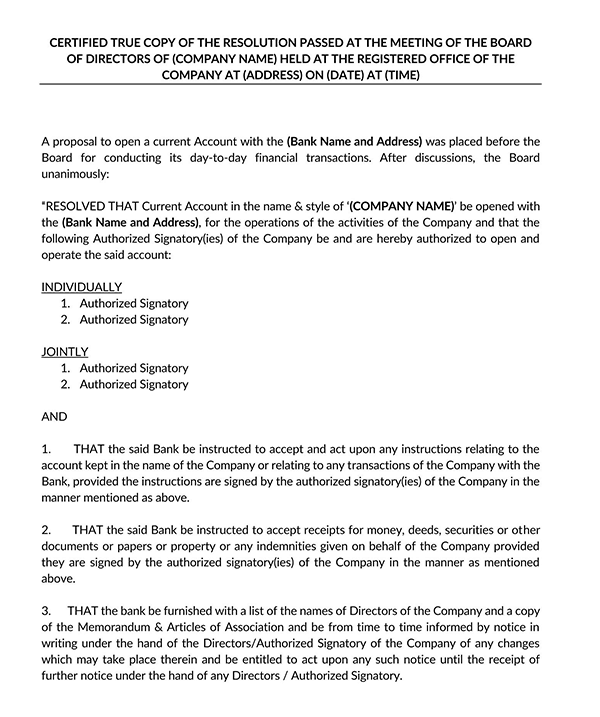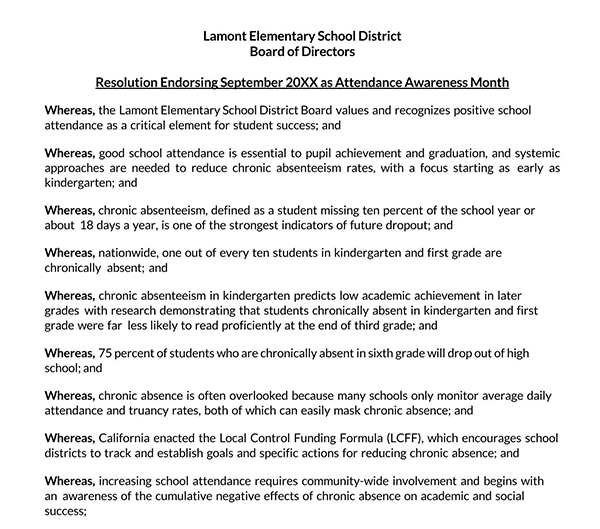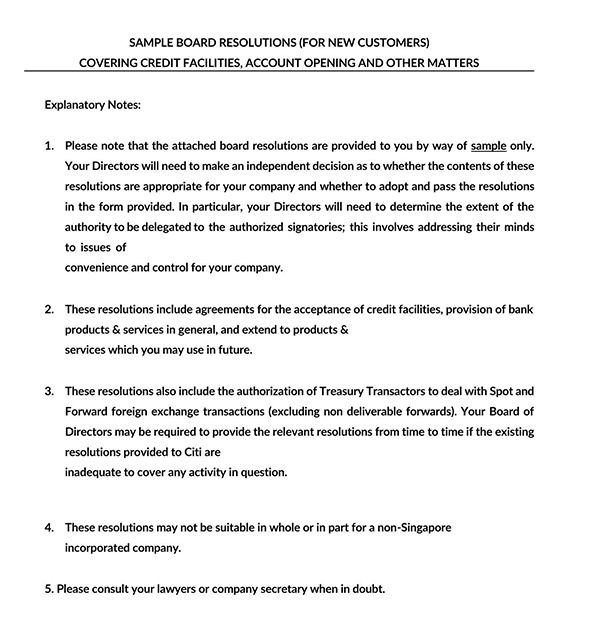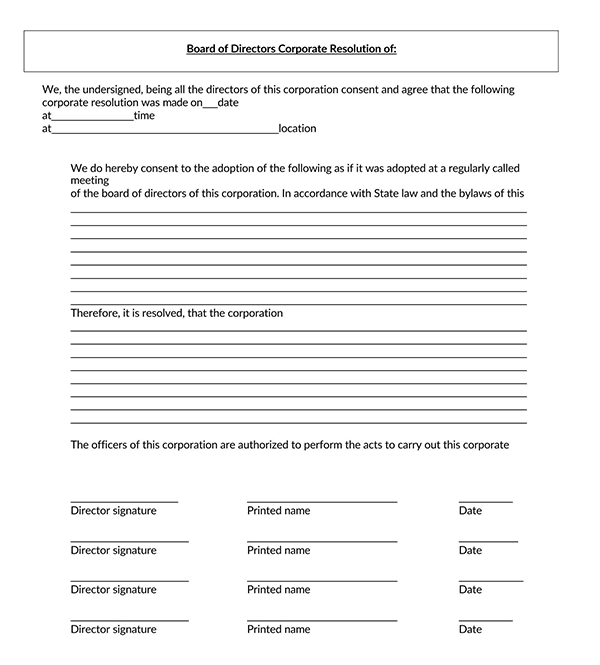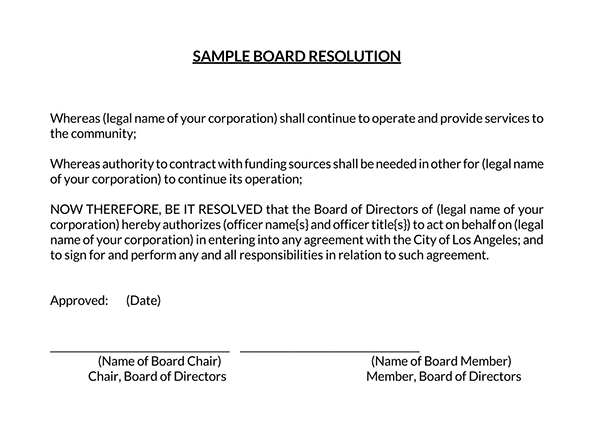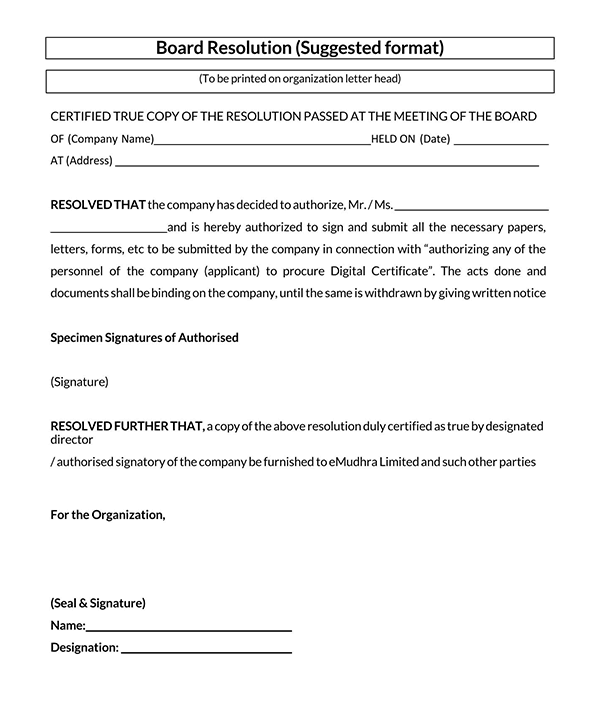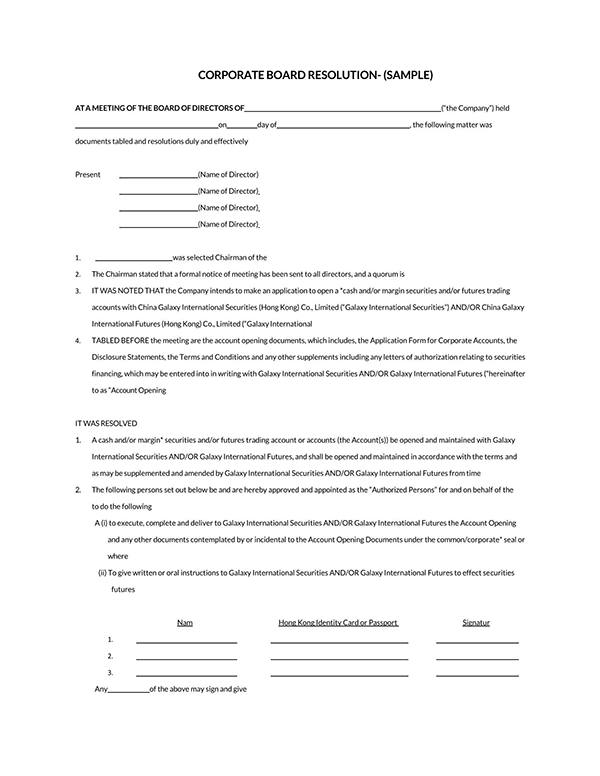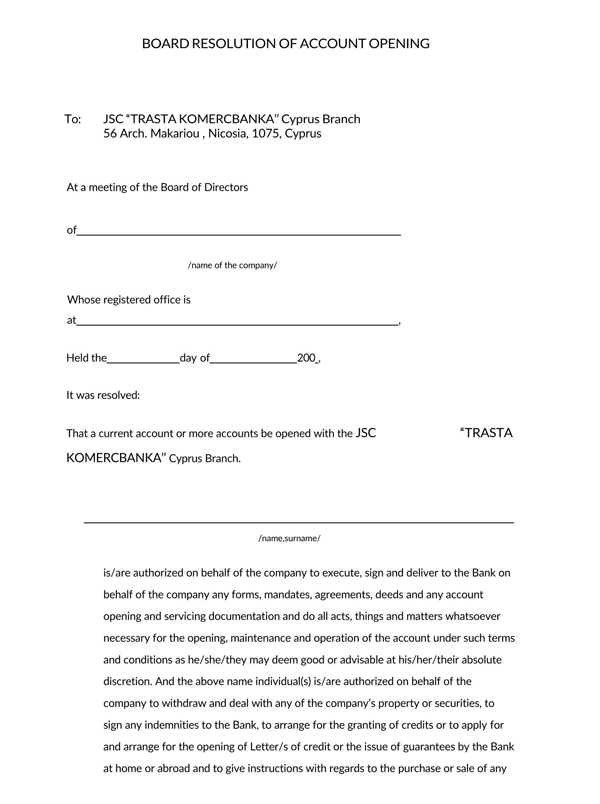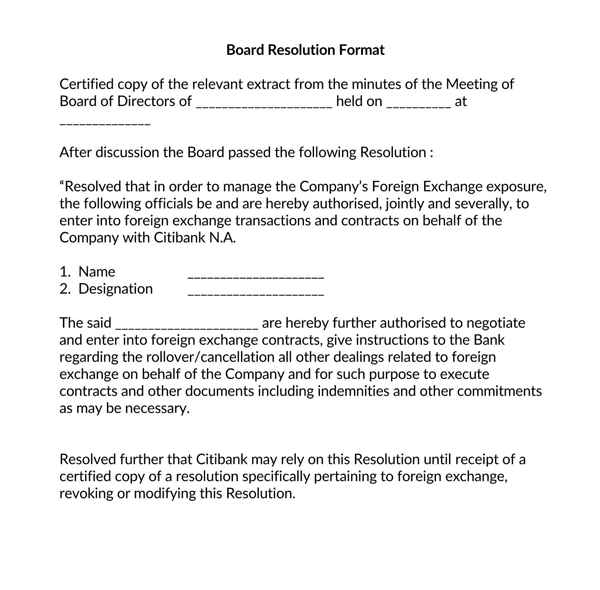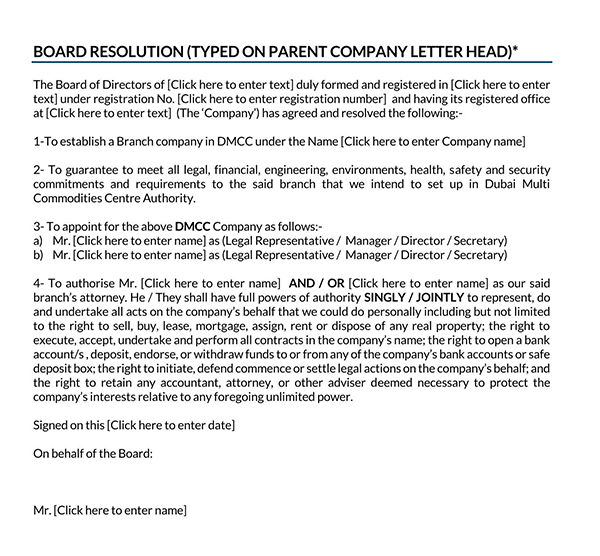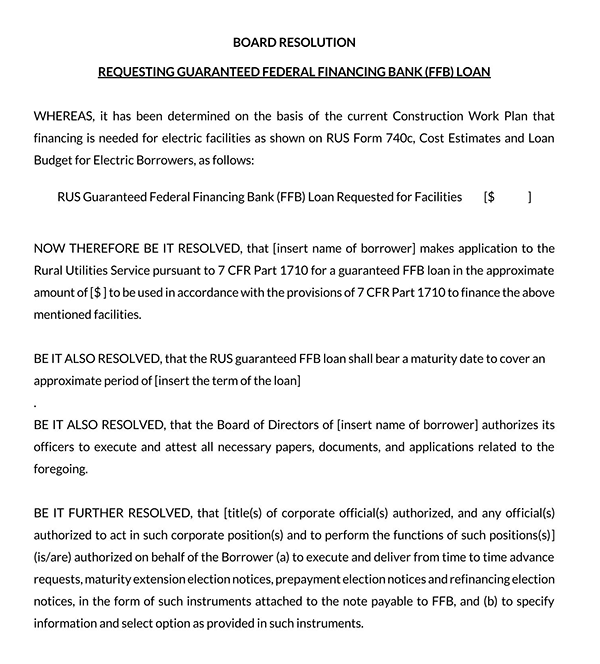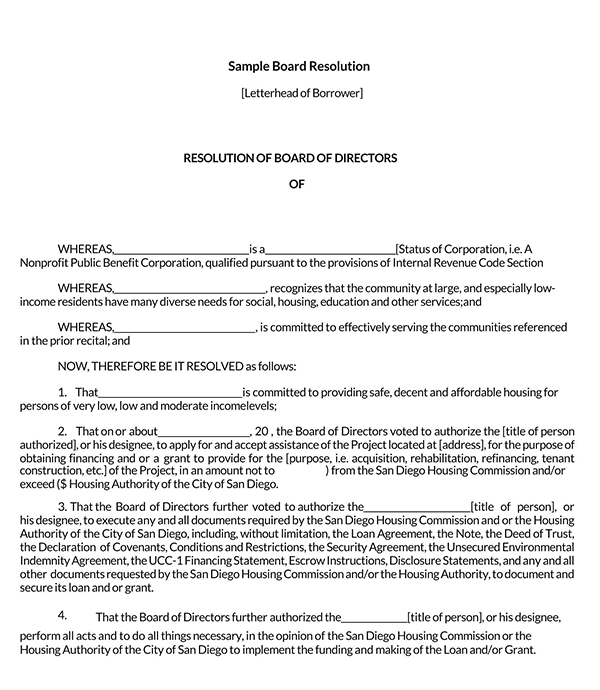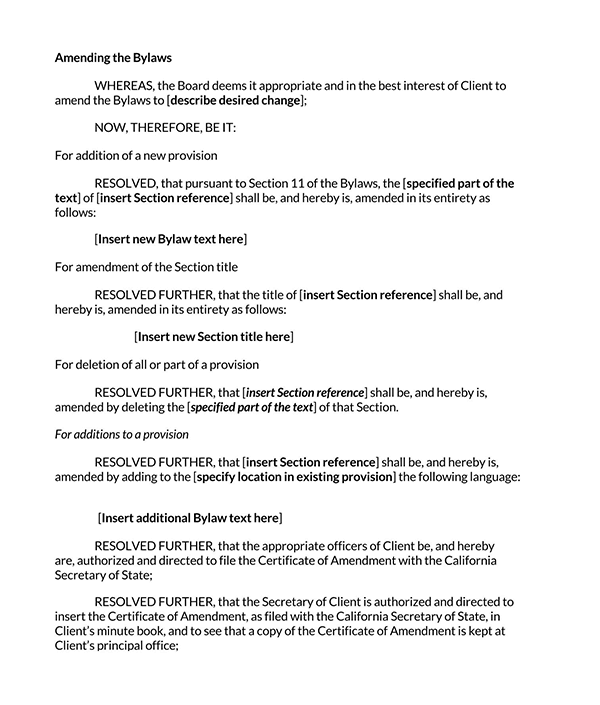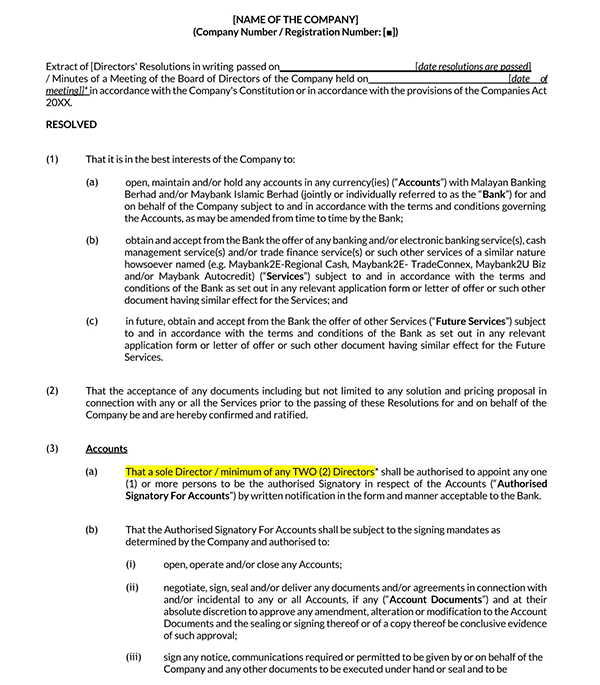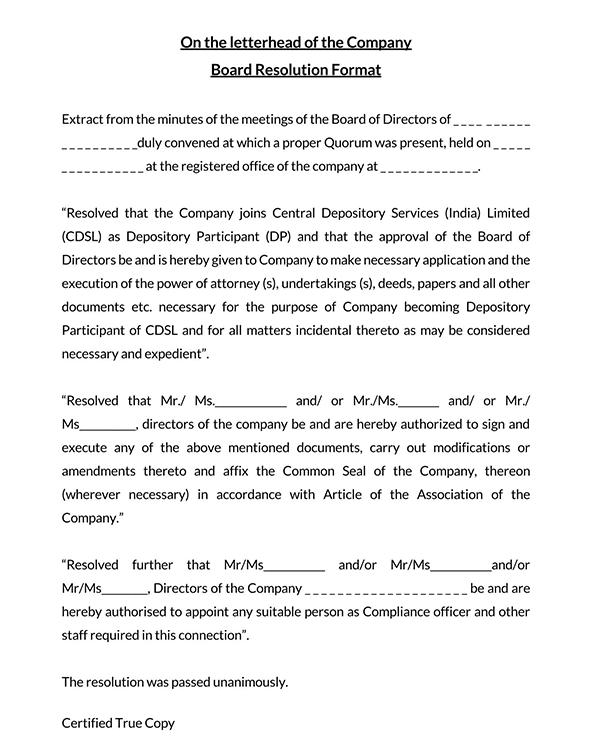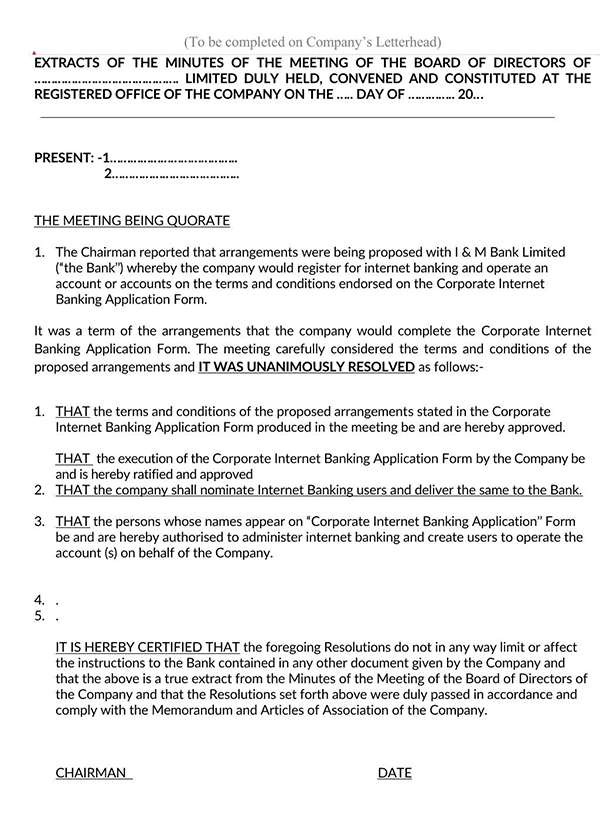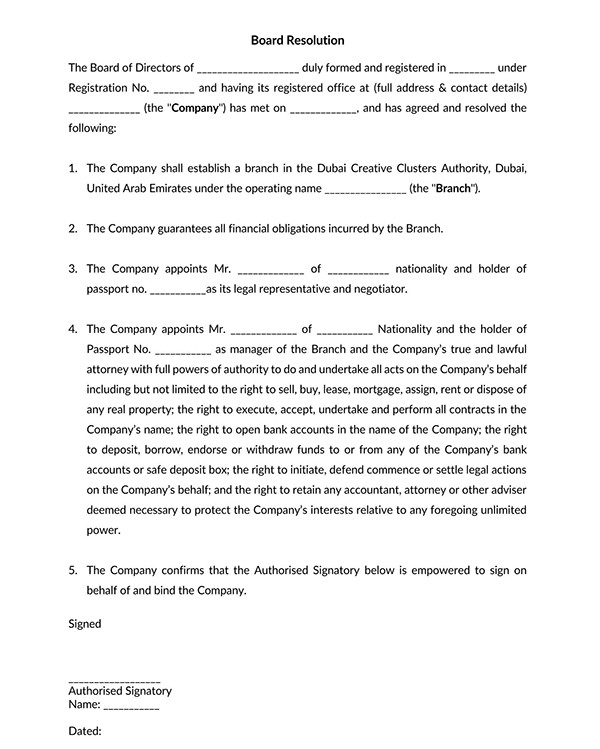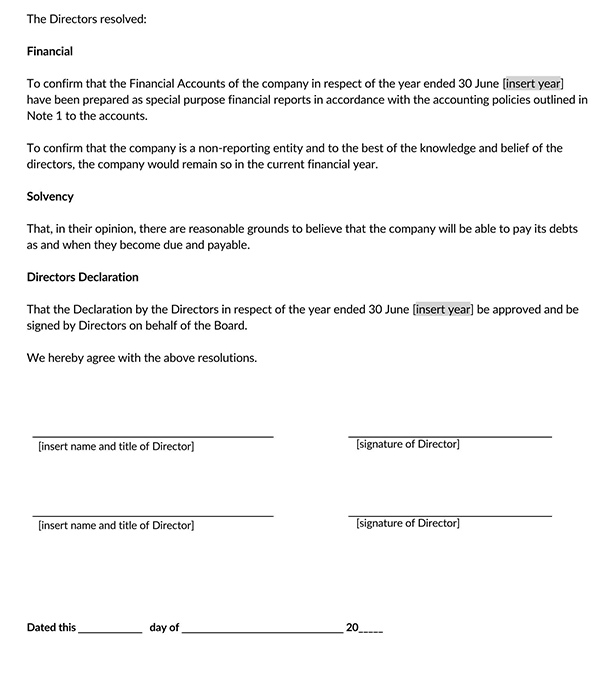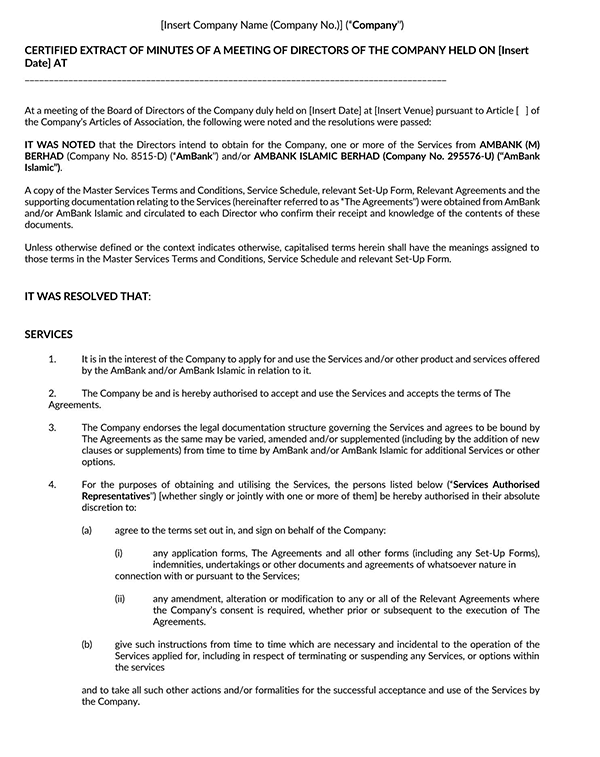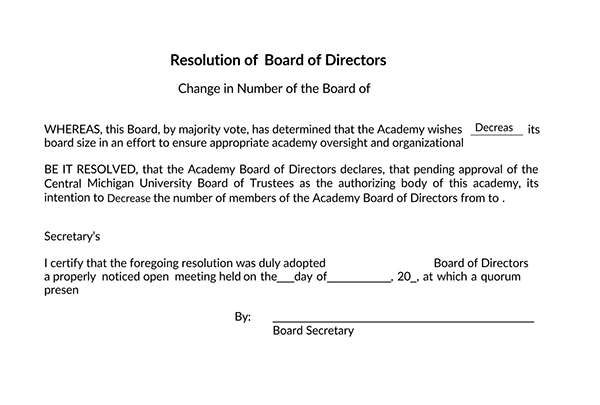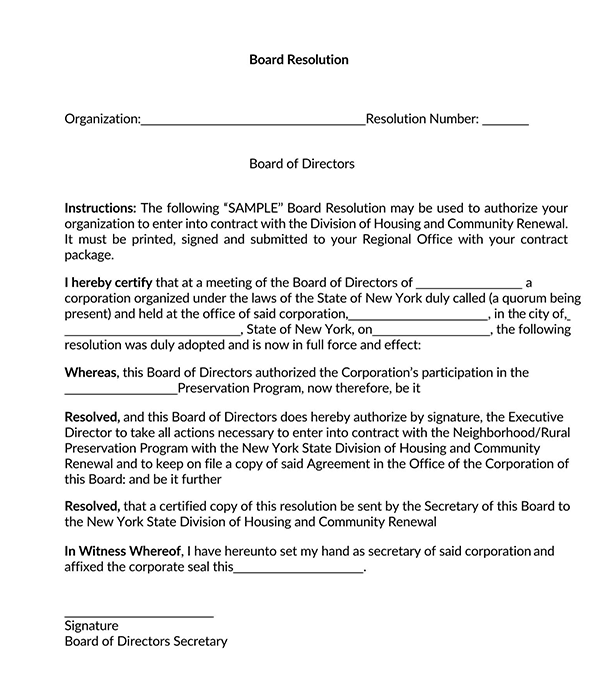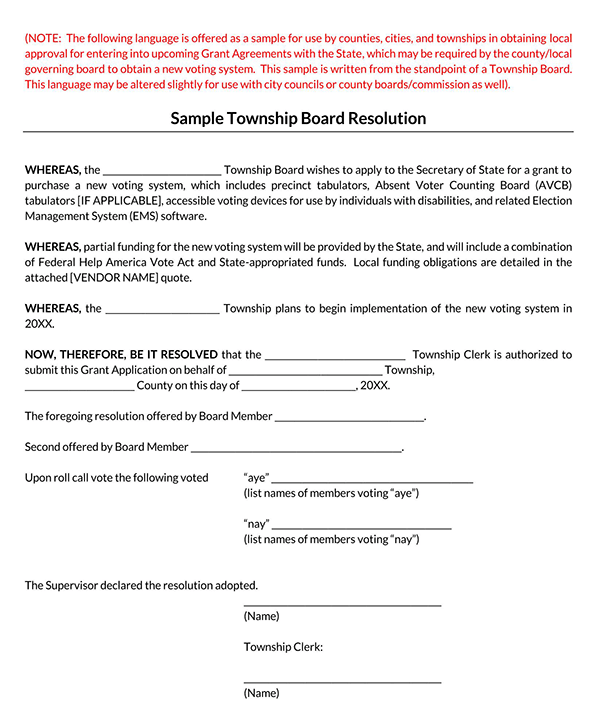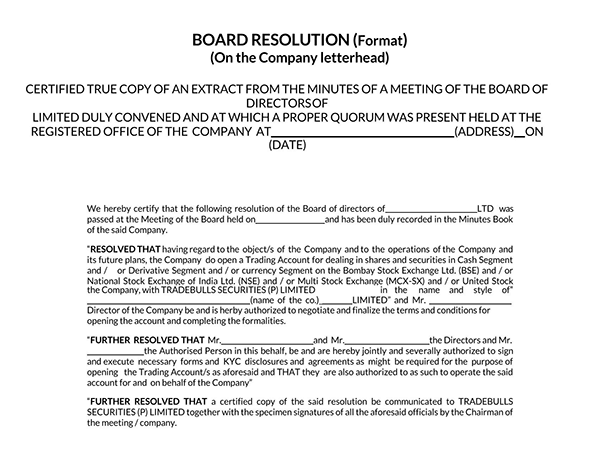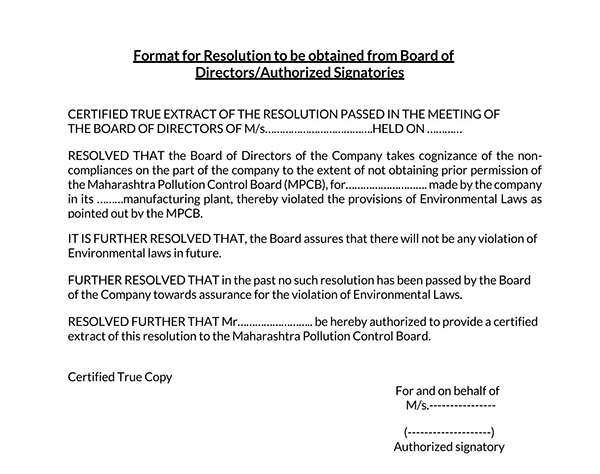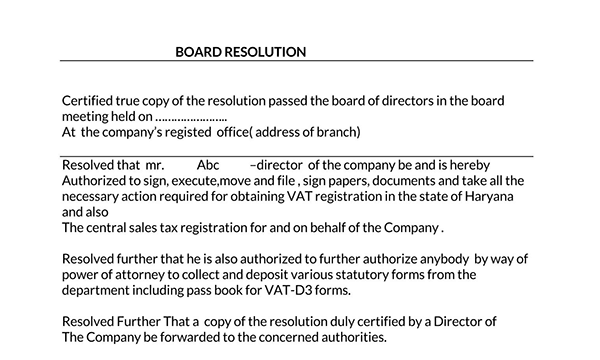A Board Resolution is a legal record of a decision that outlines the outcome of any votes or rulings made by the board of directors concerning the company. A Board Resolution Template, on the other hand, is a pre-made document that just needs to be filled and it serves the same purpose as a hand-typed resolution.
It is a formal document that is used to clarify that the decisions included are legally binding. Resolutions and approvals should be kept in the official records or meeting minutes by the board. The resolution also outlines the corporate officers’ responsibilities and obligations and serves as proof of compliance.
Making the resolutions a frequent habit is an indication of excellent governance. The entire board is responsible for its decisions. Individual directors could be held personally accountable on certain occasions if they fail to fulfill their responsibilities properly.
EXAMPLE
According to the Companies Act 2006 in the UK, a firm should keep the resolution with the meeting minutes for at least ten years from the resolution date.
It is, however, recommended that all resolutions, no matter how old, be kept. By keeping the resolution, the board can show that it operates in good faith in the future if someone disputes its judgments or methods.
Free Templates
When does a Board Use Resolutions?
The resolutions are important in making major business decisions, be it buying property, expansion, stocks, etc. Below are the reasons that boards use resolutions. Boards may choose to record their decisions or actions with a resolution for a variety of reasons. The resolution serves as evidence of what occurred during the meeting and why certain decisions were made.
The resolutions are required for the following actions:
- Expansion and purchase of businesses.
- Streamlining the workforce.
- Buying real estate on behalf of a company.
- New stock is being sold.
- Buying intellectual property rights is a common practice.
- When the board of directors appoints executives.
- When a company seeks to sell new stock.
- When the board of directors wishes to enhance the size of payment distribution.
- When the corporation buys another company.
- When a firm decides to buy real estate.
Why Have a Board Resolution Template?
A template is a way for the company’s shareholders or board of directors to document their decisions. The decision can be about anything related to the organization’s affairs, such as extending loans to other companies or voting for a new member to join the board of directors. Since the resolution is a lawful document, it is essential to ensure that it is correct and accurately reflects the board’s true decision and logic.
Having a template means you can get advice from your legal team on presenting the decision accurately and then using it for all future resolutions without stressing missing vital details. A template also ensures that the paperwork is consistent, making it easier to locate important documents in the future.
Board Resolution Templates
Types of Board Resolution
There are three types of board resolution: ordinary resolution, special resolution, and written resolution. In this section, we have explained these three types in detail to help you understand their purposes:
Ordinary resolution
An ordinary resolution is one in which the majority votes (51%) outnumber the minority votes (49%). An ordinary resolution is a resolution that has been supported by more than half of the motion’s supporters, who were either present or representatives at the General Assembly and confirmed their attendance.
Electronic voting, polling, and hand-raising are used to cast a vote in favor of the resolution. The most common approach corporate bodies conduct business, or the board of directors seeks shareholder authorization of its actions is through an ordinary resolution. Only in extraordinary cases should a copy of an ordinary resolution signed by a company official be sent to the registrar. Only those who are present during the voting exercise will be accounted for.
Ordinary resolutions are used in simple tasks such as:
- Adoption of the final financial statements.
- Declaration of payments.
- Directors’ retirement and re-appointment
- Auditors’ retirement and appointment, as well as their salary.
Special resolution
Special resolutions, sometimes known as ‘exceptional resolutions,’ are required for more important choices or to influence a company’s constitution. These require the approval of at least 75% of the shareholders or directors and 95% in some cases.
A special resolution is for important changes to the business structure, such as changing the name or amending the articles of association. Revising the provisions of the association memorandum, changing the articles of the organization, buying back shares or securities, changing the prospectus’s objects, changing the company’s registered office, and so on are all subjects that require special resolutions.
Written resolution
Written resolutions enable board and shareholder decisions to be made without a meeting with the board or shareholders. Instead, a written resolution summarizing the decision can be sent to the necessary audience to sign and return, certifying their agreement. A written resolution can be ordinary or special depending on the subject being discussed.
Sample Board Resolutions
Here are some free sample for your better understanding:
How To Write a Board Resolution Template
Writing a proper template is not difficult. However, since they are official documents, there are a few things to keep in mind.
Below are key details that will help you when writing a template:
Introduction of a board resolution
It is important to write a resolution for the things that a company wants to do. When writing the resolution, remember to obtain a copy of the resolution on the firm letterhead, have at least two corporate directors sign the resolution at a board meeting, and request that your company’s seal be included in the resolution.
EXAMPLE
When buying properties, each property that a corporation wishes to buy will require the resolution.
Generally, these are the first resolutions that a company approves. In a case where you own a company, you can create and pass the resolution on your own. One or more officers and directors can be named in the resolution to open and handle corporate accounts on their behalf. Copies of the resolution should be kept with other business documents.
The date and number of the resolution
At the top of the page, write the date the resolution was made and a resolution number. A resolution number is printed on the front of the letter to help organize and track all resolutions made during the company’s lifetime.
Consider giving each resolution a number, starting with 000001 for the first resolution, 000002 for the second, and so on. Make sure you write it in ascending order and preserve a copy for corporate. It should be kept in the office with other resolutions. Keep all copies in one folder.
The company name
After the resolution number, the next step is writing the company name. Writing the company name is important as it verifies that the resolutions passed belong to a specific company.
EXAMPLE
Certified Copy of the resolution approved at the shareholders meeting of __________________(Company Name)
The title of the resolution
The resolution’s title should be the same as the issue that was discussed at the board meeting. Always include the resolution’s title in the resolution letter so that the reader understands the letter’s content. He should be able to figure out what the letter is about just by looking at the title. The title should be simple.
EXAMPLE
Resolution to Enter a Rental Agreement with XYZ Company to Establish Company Headquarters.
Statement of the board’s responsibility
Boards oversee making key decisions on important company issues and defining management strategies. They’re also in charge of establishing corporate goals and objectives and ensuring that they’re in line with the company’s mission.
EXAMPLE
It is the board’s responsibility to designate funds for a specific purpose.
Statement describing the issue
Write a resolution statement that relates to the issue you want to address. This issue statement will help the reader know what issue was discussed in the resolution.
EXAMPLE
Resolution to Allocate Funds from the 2013 Fundraiser to the Finance Department.
Final resolution
The conclusion reached during the board meeting should be included in the last “whereas” paragraph. It summarizes what was agreed upon and how the board resolved the problem. You can either declare the decision directly or provide a breakdown, such as who voted yes and no.
EXAMPLE
Whereas, it has been determined and decided that the funds raised from the 2007 Team Building will be used to support the organization’s 2009 Charity Fundraiser Project.
Names of the directors and a description
Most resolutions and resolution letters should include a breakdown of votes cast by company officials to ensure transparency in voting at board meetings. A list of all the officers present in the board meeting and who voted should be included in the letter. It should also include each officer’s vote, whether they voted in favor, against, or did not vote at all. Their vote should be listed next to their names on the ballot.
Signature and the date
Finally, the resolution letter should be signed by the president of the company to verify its legitimacy. The letter should be sealed with the company seal if possible and appropriate. Also, ensure the president’s signature on the resolution letter is dated. The signature must be placed on top of the printed name of the president.
Ensure that each clause in the “whereas” part of the resolution is followed by a comma and then the word “and.” After writing the last clause, add a colon.
There is a variety of linking terms and phrases that can be used to connect the resolution’s many clauses, such as:
- Acknowledging
- Alarmed
- Approving
- Concerned
- Confident
- Convinced
- Declaring
- Desiring
- Deploring
- Determined
- Emphasizing
- Endorsing
- Expecting
- Fulfilling
- Mindful
- Observing
- Realizing
- Recognizing
- Reiterating
- Seeking
- Stressing
- Welcoming
Resolved Clauses
The resolution reader will know the action he is being asked to take part in, referred to as the resolved clauses. This should be the most important section. To keep the language dynamic, always begin the resolved clause section with a verb. In addition, a semicolon should be placed between each of the operative clauses, with the last one being followed by a period.
Here are some of the common sentences that begin resolved clauses in a section:
- Accepts
- Adopts
- Affirms
- Appeals
- Appreciates
- Approves
- Authorizes
- Calls upon
- Comments
- Concurs
- Condemns
- Confirms
- Declares
- Designates
- Directs
- Promotes
- Recognizes
- Recommends
- Seeks
- Suggests
- Supports
- Urges
Sample of a Board Resolution
The following resolution was approved at a duly arranged meeting of the Board of Directors of_________________(company name) on _____________(date).
Appointment of approved person:
It was resolved that_________________(name of the appointed person), ___(ID/Passport number), who is_____________(his/her title) in the company be hereby appointed as the approved person as defined in the Building Control (Licensing of Builders) Regulations 2006, under whose charge and direction the management of the business of the company relating to general building works or specialist building works in Nairobi is to be at all times.
We__________________(name of the director) and________________(name of the secretary) hereby certify that this resolution has been recorded in the minute book and signed by the Director(s) of the Company is in force, and does not in any way exceed the objects or powers of the Company or the powers of the Director(s).
_______________ __________________
(Director’s name and signature)
_______________ ___________________
(Secretary’s name and signature)
Tips for Writing a Board Resolution Template
Before we finish this article, we would like to give you some tips on crafting a professional resolution for your company that is effective and concise.
The following tips will guide you when coming up with the resolution:
- Keep it as brief as possible to focus on the issue at hand. Other than the issues at hand, their resolution, and administrative needs such as signatures, there is no need for any other information.
- Make it as clear as possible. Make sure everyone understands what the board decided and why they did so in case anyone needs to go back and analyze the objective of the board’s decision later.
- Use formal language since the resolution is a formal document. Even though it is not required, it is advisable to start sentences that relate to the company’s current state with the word “whereas.”
- Give the resolution a reference number to make it easily retrievable in case it is needed in the future.
- Give the resolution a title that specifies what the issue being resolved is. This will also make it easier to find the correct document in the future.
- At the very least, have a corporate lawyer review your template. Ensure that it contains all of the information necessary for it to serve as a company record.
- Note if the board of directors’ resolution is unanimously agreed or not. If not, add each member’s vote decisions to reflect the divide.
- Use board management software to ensure that the documents are kept safe and easy to find when needed.
Frequently Asked Questions
The board may choose to employ a written resolution for a variety of reasons. For example, it’s possible that a decision needs to be made fast before the next meeting. Alternatively, if the issue is minor, a written resolution can avoid wasting valuable meeting time. Other reasons include if the outcome is assumed to be predetermined or if all members have explicitly announced that they will vote in favor of it.
A certified company resolution has been verified by the company secretary and approved by the CEO. These are frequently presented to external agencies for action approval.
Yes. Once the board resolution has been agreed upon, the CEO and other directors of the company should sign it.
